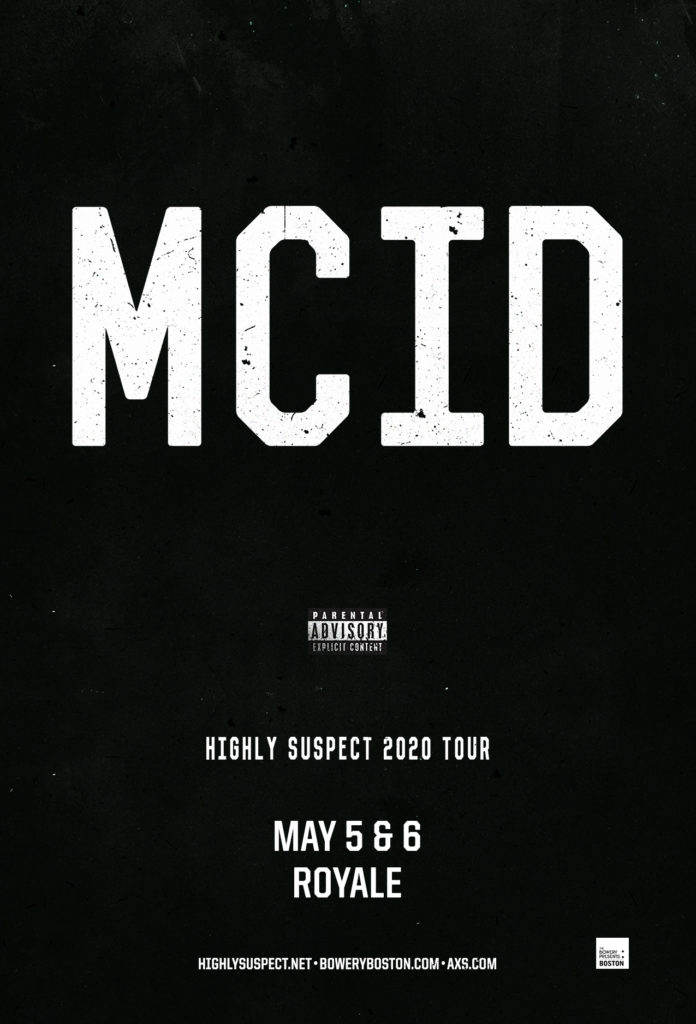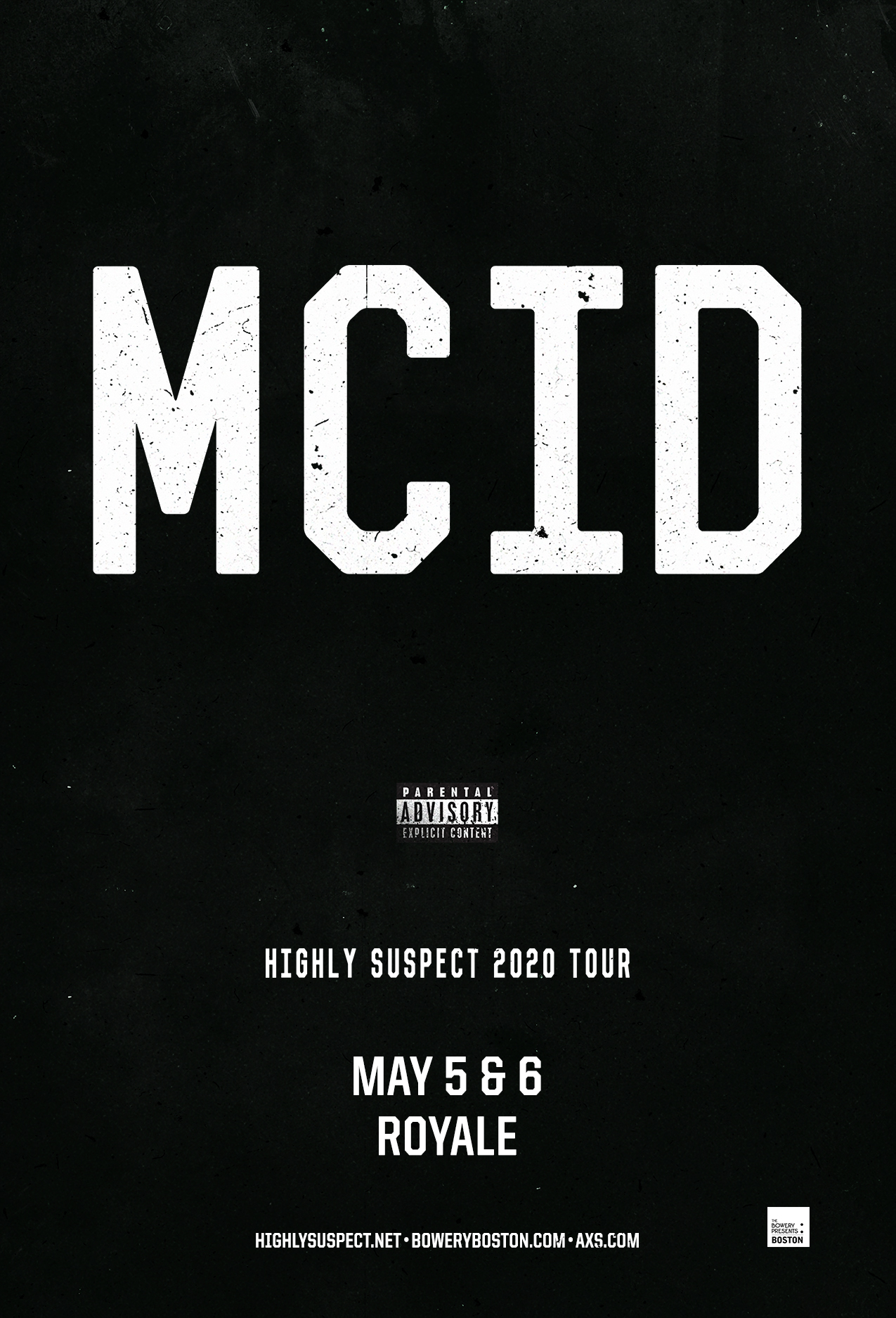Presented by Bowery Boston
Doors: 7:00 pm / Show: 8:00 pm
This show has been canceled. Refunds are available at point of purchase.
Tickets available at AXS.COM, or by phone at 855-482-2090. No service charge on tickets purchased in person at The Sinclair Box Office Wednesdays-Saturdays 12-7PM.
Please note: this show is 18+ with valid ID. Patrons under 18 admitted if accompanied by a parent. Opening acts and set times are subject to change without notice. All sales are final unless a show is postponed or canceled. All bags larger than 12 inches x 12 inches, backpacks, professional cameras, video equipment, large bags, luggage and like articles are strictly prohibited from the venue. Please make sure necessary arrangements are made ahead of time. All patrons subject to search upon venue entry.
***

***
Highly Suspect

Two Time Grammy-nominated, festival-storming trio Highly Suspect, are returning with second album The Boy Who Died Wolf on November 18th. The moving, jubilant LP from the Brooklyn alt-renegades follows two Top 10 Mainstream Rock hits (“Lydia,” “Bloodfeather”) and two Grammy nominations (Best Rock Song, Best Rock Album) just one year from the release of their 300 Entertainment debut, 2015’s Mister Asylum. For the follow-up, the band — Johnny Stevens (guitar/vocals), and fraternal twin brother rhythm section Rich (bass/vocals) and Ryan Meyer (drums/vocals) — are reappearing stronger, livelier and more mature.
“The title The Boy Who Died Wolf, its like, we were so young and now we’re adults,” says Stevens. “I went through a lot of issues that I had to sort out and sometimes I cant believe that I’m alive. And now here I am traveling the world with my best friends, making music, and living the exact dream that we had set out to accomplish a long time ago … We’re learning a different lifestyle. And it’s good, it’s positive. But it’s also hard to let go of everything that happened in the past.”
That new lifestyle comes in the wake of success that’s snowballed since 2014, featuring Grammy nods; radio smashes; stops at major festivals (Lollapalooza, Bonnaroo, Reading and Leeds and so on); tours alongside Scott Weiland, Chevelle and Catfish & the Bottlemen to name a few; tours around the world including Australia, New Zealand, Europe and the UK as well as multiple headlining tours in the United States one of which is currently underway. The feeling of celebration infuses The Boy Who Died Wolf, while still heading into haunted regions of Steven’s past, yowling somewhere between the metronomic robot metal of Queens of the Stone Age, the bluesy wallop of Jack White and the feedback-shrieking noise-pop of In Utero-era Nirvana.
To record the LP, the band traveled far from their New York comfort zone to Bogotá, Colombia, recording with Mister Asylum producer Joel Hamilton (The Black Keys and Wu-tang, Tom Waits, Elvis Costello,).
“Normally we would record in New York or L.A., and when we’re in those places we just have too many distractions, too many friends,” says Stevens. “When you’re trying to make art.. pure art, it’s good to be secluded. So we were literally in a fortress, 20-foot walls all around this compound in the middle of Bogota.”
“The energy around you, the culture that you’re taking in, will affect the songs,” he continues. “We were really enjoying ourselves. So I think there’s a little more step to this album. There’s happier tones. There’s some dark stuff too but there are simply more uplifting moments on this album. I think we finally realized we are supposed to be here making music. That people like what we do. We had more trust in ourselves and each other and just let the music come out.”
The upbeat vibe begins to show its face lyrically in the lead single “My Name Is Human” (“I’m feeling the way that I’m feeling myself”), and then appears full force on the blazing desert-rock dynamite of “Postres” (“I’m havin’ fun for the rest of my days”), but takes a back seat in their dreamy cover of Real Life’s 1983 new wave swooner “Send Me an Angel” and on the anthemic “Little One” which reminds us all of the hopeless, lovelorn pangs that most have undoubtedly felt in the pit of their guts somewhere along the lines. But even the more serious songs are steeped in an unrelenting optimism. A great friend of theirs took his own life while the band were in Colombia, to which they responded with “For Billy,” a beaming post-grunge burst.
“The song is not a downer, it’s sad, but it’s a charged up anthem,” explains Stevens. “It’s what he would have wanted. It was a really sad moment but he was such a happy person. So that song is something he can blare through his Harley speakers wherever he is now.”
Johnny describes Billy as an “original crewmember” of MCID, the collective shouted out on Highly Suspect’s jackets, hats, lyrics and tattoos. “That’s our ethos,” says Johnny of the acronym that stands for “My Crew Is Dope.” “We’re trying to invite any and all positive people to what was once exclusively for us. We’ve realized its bigger than us; as long as you’re not a racist, not a homophobe and you have good intentions then we welcome you to join the family and spread the love.” In turn, Wolf’s “Viper Strike” namechecks MCID in a venomous, knives-out attack on bigots: “We’re all equal except for you/’Cause you’re an asshole with an ugly point of view”
“It’s a family of positivity that we’re really trying to build,” says Johnny. “Our whole purpose is not just about being some famous fuckin’ band, but kind of making a movement. Making a difference for our generation who are so constantly misled. We barely made it out of the wrong mentality. We want to help. We’re no fuckin hippies, those days are gone. The irony is that now you have to “fight” for positivity. Which is crazy but so be it. We’re strapped and ready to defend free thinking. When you come to our shows, it’s kind of like this family affair.”
***
Summer Cannibals

Summer Cannibals at Cobalt Studios in Portland, OR, March 2019. Photo by Jason Quigley.
You know what you did, you know what I saw. Now I take back my doubt so that you’ll crawl.
Summer Cannibals’ fourth album Can’t Tell Me No, out June 28th on Tiny Engines, is a defiant release whose very existence is the result of taking back power—after escaping a manipulative personal and creative relationship, guitarist/vocalist and bandleader Jessica Boudreaux chose to scrap an entire record that had been finished for over a year and start from scratch. “We had to sacrifice an album we’d worked hard on so that someone abusive and manipulative couldn’t benefit from it,” says Boudreaux. “It was, in a matter of 24 hours, making the decision to start something new or let them win.”
Creation and determination prevailed; along with Cassi Blum, Devon Shirley, and Ethan Butman, Boudreaux wrote and recorded and mixed many of the new tracks during 14-hour days. She and Blum hunkered down in Boudreaux’s home studio, where they had been already been engineering records for other bands, and finished Can’t Tell Me No as Summer Cannibals’ first entirely self-engineered and produced album.
“Writing this record and making it ourselves was about liberation from the parts of an industry that have protected abusers for way too long, and about saying fuck you to the people who have invalidated my and so many others’ experiences of abuse,” says Boudreaux. “It’s really easy for people to condemn the government and figures we see on the news,” says Boudreaux, “but those same people often fail when it comes to standing up to and calling out the people in their lives who are just as evil.” Songs like “False Anthem” confront this cowardice; “Hate who they are, say you hate what they do,” snarls Boudreaux against an insistent, hard-charging guitar, “but you love all the things that they promise you.”
The Cannibals formed in 2012 and gained a fervent following on the local Portland scene, eventually playing with some of their musical heroes including L7, Mudhoney, Stephen Malkmus and the Jicks, and The War on Drugs, and touring with Ted Leo & the Pharmacists and Cursive. They’ve played some major festivals including Sasquatch, Project Pabst and Riot Fest, and made their TV debut in 2016 on Last Call with Carson Daly. Along the way, they released 2013’s No Makeup and 2015’s Show Us Your Mind on their own label, New Moss Records, and 2016’s Full Of It on Kill Rock Stars. Show Us Your Mind appeared on NPR’s Sound Opinions Best of list in 2015, and Pitchfork said that on Full Of It, the Cannibals “expertly balance flame-belching Mad Max riffage with lyrics frankly exploring questions of co-dependence and need.”
Now with Can’t Tell Me No, the Cannibals are as honest and confrontational as they’ve ever been; though ironically, more harmonious as a band. With the inspiration and adrenaline driving the new album’s creation, the current members of Summer Cannibals are working together in a new, reinvigorated way. “This is the first time that we’ve had all four members who are really dedicated and care about their role in the band,” says Boudreaux. “We function as a unit and everything goes so smoothly. I think we all feel very supported.” That support comes through in the confidence on songs like “Like I Used To,” a self-assured anthem to the renewal that comes with independence and leaving violent toxicity behind you.
Because where there is anger there is also hope, and Can’t Tell Me No is, as much as anything, about finding love and acceptance on the other side of pain. “Part of getting over my past has meant looking forward and letting myself know that I’m capable of love in the context of an honest, open and communicative relationship,” says Boudreaux. Songs like “Into Gold” encapsulate this; a warm,Be My Baby manifesto that promises “I’ll be the one to want to break this mold, pull you out of the dark and back into gold.”
And on a larger scale, Can’t Tell Me No stands up not just to a relationship or an industry, but to the people and constructs that have been trying to silence women and hold them down for so long. “It’s about doing the right thing,” says Boudreaux, “even when it’s terrifying.”



